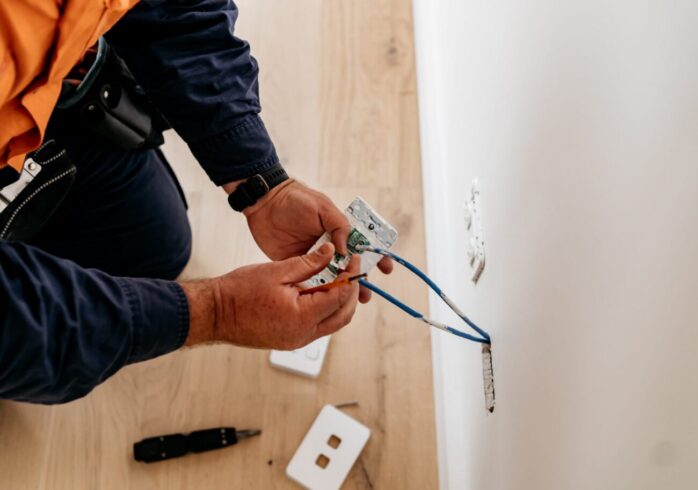
According to the Health Electrical Services, every year, around the world, 1.2 million people get injured in electrical accidents. This big number highlights just how people can easily sustain these injuries.
Key Takeaways:
- Identify warning signs of electrical hazards and their causes
- Know the possible risks and when to seek help from professional electricians
- Must know electrical safety tips and how to prevent electrical hazards
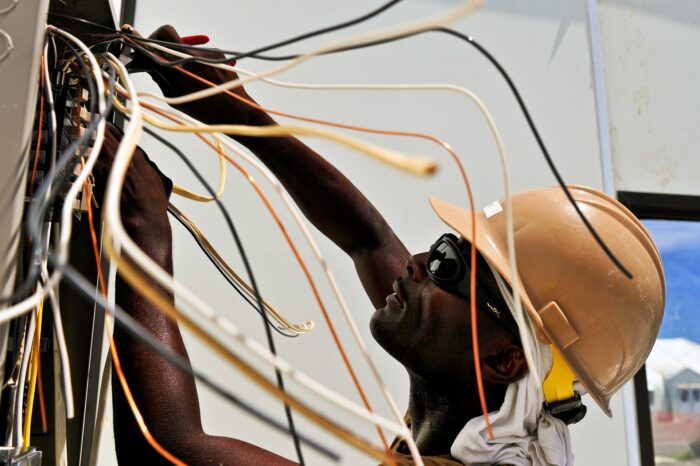
Leading Causes of Electrical Hazards
| Hazard | Cause |
| Overhead Power Lines | Overhead power lines can cause risks, especially during construction or maintenance activities. Accidental contact with these lines can result in electrocution and fatal injuries. |
| Damaged Tools and Equipment | Using damaged or malfunctioning electrical tools and equipment increases the possibility of electrical shocks and fires. |
| Inadequate Wiring and Overloaded Circuits | Improperly installed wiring or overloaded circuits can lead to overheating and electrical fires. |
| Exposed Electrical Parts | Exposed electrical parts, such as outlets and switches without covers, directly threaten electrical shocks. |
| Improper Grounding | Inadequate grounding of electrical systems can result in electrical shocks and equipment damage. |
| Damaged Insulation | Damaged insulation on wires increases the risk of electrical shocks and short circuits. |
| Wet Conditions | Operating electrical equipment in wet conditions heightens the risk of electrical shocks and short circuits. |
When to Call for Professional Electricians
This comes down to the importance of recognizing the signs of electrical hazards and knowing when to contact professional electricians to address the issues promptly. If left unattended, electrical problems can pose severe risks to your property and personal safety.
Sudden Power Outage
Unexplained electricity loss can indicate various issues, such as damaged wiring, faulty appliances, or grid failures. Ignoring this issue can lead to prolonged disruptions and increase the risk of electrical fires or equipment damage. You must immediately investigate this matter to identify and address the root cause.
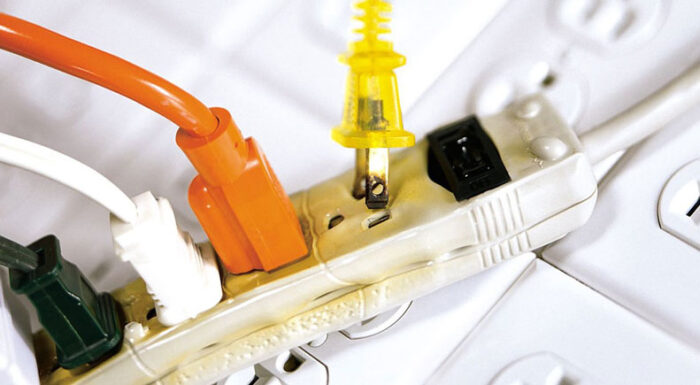
Burning Odours
When you smell burning odours from your electrical outlets or appliances, it only signifies potential wiring issues or overheating components. This can escalate into electrical fires, posing serious risks to life and property, so you must promptly ask for professional help.
Visible Sparks or Electrical Arcing
Sparks or arcing indicate loose connections or damaged wiring, leading to electrical fires if ignored. As soon as you see sparks, disconnect the power and seek professional assistance immediately.
Flickering Lights
Flickering lights can result from loose connections, overloaded circuits, or faulty fixtures. It’s best to inspect the affected electrical components to prevent electrical hazards. If you’re unsure how to do it, you might need to ask for help from an electrician.
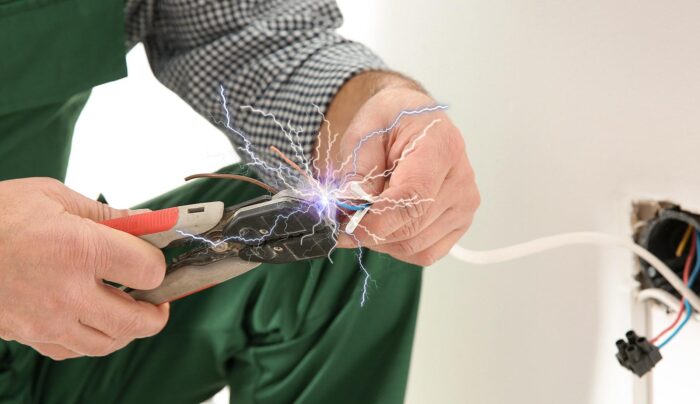
Electrical Shocks
You shouldn’t ignore any form of electrical shock, even mild. It may indicate underlying wiring issues or faulty equipment that require immediate attention.
Electric shocks can pose varying effects depending on factors such as voltage, current, and duration of exposure.
| Current in Milliamperes | Effects |
| 1 – less | No noticeable effect |
| 1 – 3 | Not painful (or mild sensation) |
| 3 – 10 | Painful electrical shock |
| 10 – 30 | Possible loss of muscular control (or muscle clamping) |
| 30 – 75 | Respiratory paralysis |
| 75mA – 4 amps | Ventricular fibrillation |
| 4 amps+ | Tissue starts burning, heart muscles contract tightly, and the heart ceases to beat |
Unexplained Tripping of Circuit Breakers
Frequent tripping of circuit breakers may impart overloaded circuits or faulty wiring. Know the root cause and address it to prevent electrical issues. If ignored, it can lead to risks such as electrical overload, equipment damage, electrical hazards, disruption of electrical supply, and increased energy costs.
Crackling Sounds Coming from Electrical Outlets
Crackling sounds suggest loose connections or faulty wiring within your electrical outlets. If you hear anything from your electrical outlets, discontinue using them and consult a qualified electrician for inspection and repairs.
Visible Smoke or Flames
Visible smoke or flames from electrical outlets or appliances indicate a severe electrical malfunction or fire. It’s advisable to leave your premises temporarily and contact emergency services and reliable electricians to fix the issue.
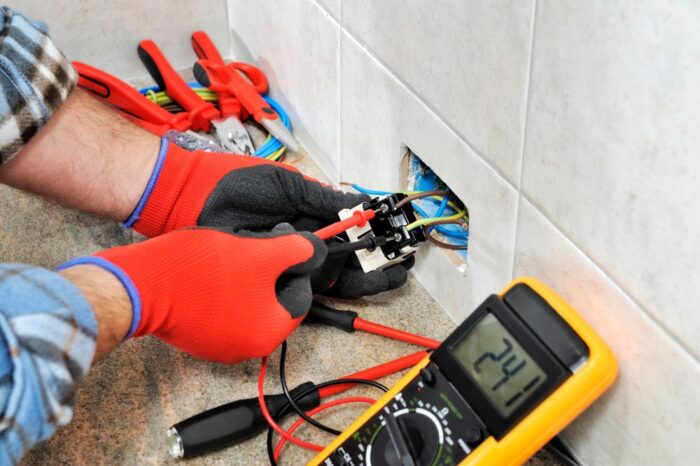
Electrical Safety Tips
Knowing some electrical safety tips is important to ensure safety. You must consider the following:
- Regular Inspections: Schedule periodic inspections by licensed electricians to ensure your electrical systems’ safety.
- Avoid Overloading Circuits: Distribute electrical loads evenly across circuits to prevent overloads.
- Use Surge Protectors: Install surge protectors to safeguard appliances from voltage spikes.
- Replace Damaged Cords: Replace frayed or damaged cords to prevent electrical shocks and fires.
- Keep Flammable Materials Away: Avoid placing flammable materials near electrical outlets or equipment.
- Proper Appliance Usage: Follow the manufacturer’s instructions to operate electrical appliances safely.
- Childproof Outlets: Install tamper-resistant outlets to protect children from electrical hazards.
- Smoke Alarms: Consider Installing smoke alarms in every room and test them regularly.
- Emergency Preparedness: Have an emergency plan in case of electrical fires or other emergencies.
- Professional Repairs: Never attempt DIY electrical repairs; always hire qualified electricians for repairs and installations.
Prevent Hazards Through Electrical Inspections and Repairs
Identifying and mitigating electrical hazards is essential to ensure your safety. You must stay vigilant, conduct regular inspections, and seek professional assistance.
Regular electrical inspections and repairs conducted by certified electricians, such as Mountain Point Electrical, are essential for identifying potential hazards and addressing them proactively.
Frequently Asked Questions
What are the risks of DIY electrical repairs?
DIY electrical repairs pose risks of electrical shocks, fires, and damage to electrical systems if not performed correctly. It’s safer to hire professional electricians for repairs and installations.
How do you prepare for electrical emergencies?
You can prepare for electrical emergencies by having an emergency plan, including knowing how to shut off electricity, having emergency contact numbers handy, and keeping a stocked emergency kit.
How often should I schedule electrical inspections for my home?
Schedule electrical inspections annually or whenever you notice signs of electrical hazards to ensure the safety of your home.






